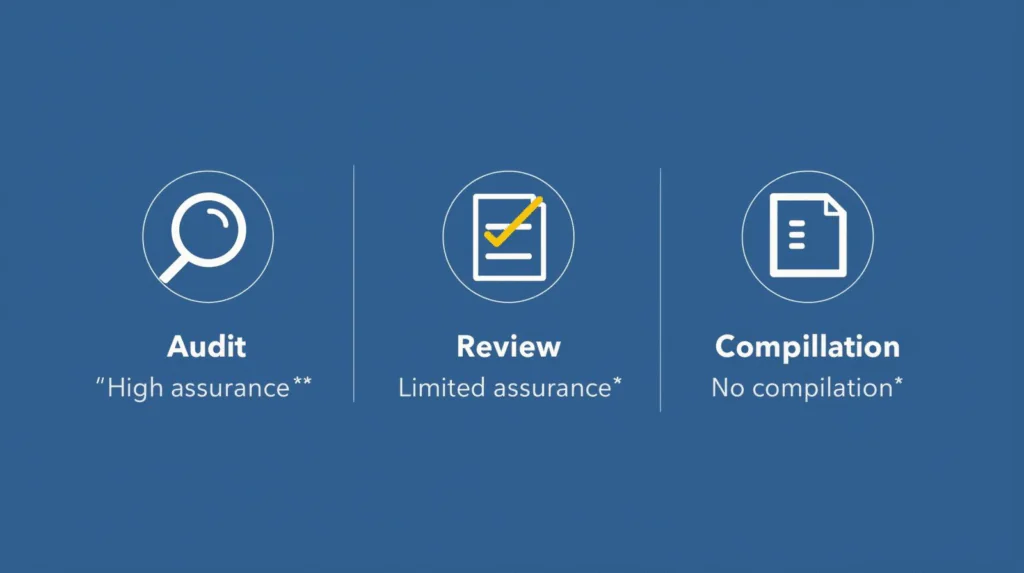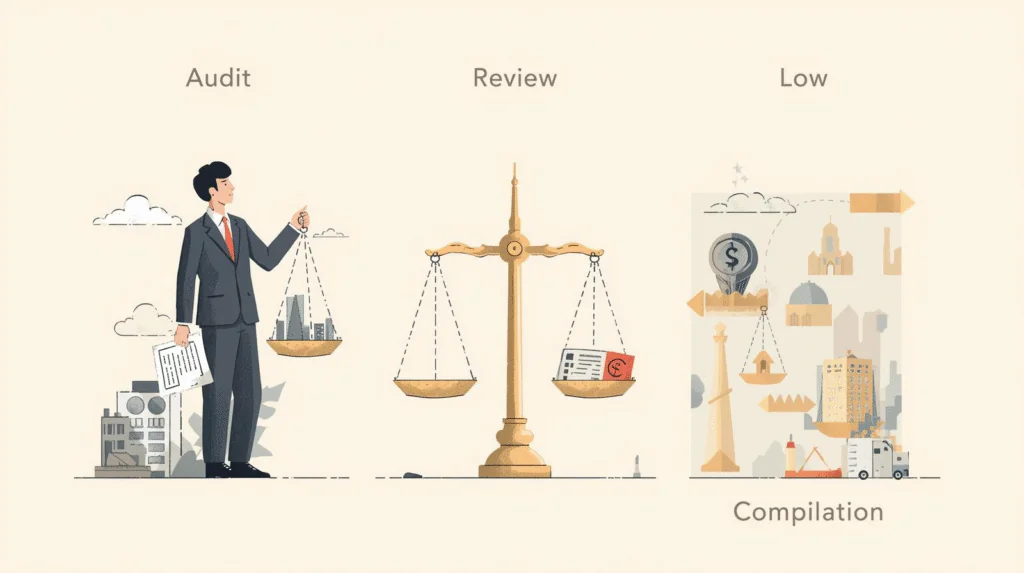Business owners in the UAE often hear the terms audit, review, and compilation but may not fully understand the differences. These services may sound similar, yet they serve very different purposes and provide varying levels of assurance. Choosing the wrong option can result in unnecessary costs, missed compliance obligations, or loss of investor confidence.
This blog will explain audit, review, and compilation in clear, simple terms. You will learn what each service means, how they differ, and which option is best for your company in the UAE. By the end, you will confidently understand audit vs review vs compilation and be able to make the right decision for your business.
Overview of Audit Review and Compilation
Simple definitions
An audit is the most detailed examination of financial statements, a review is a limited check using inquiries and analysis, and a compilation is the preparation of statements using management data without verification. Each represents a level of service from high assurance to none. Businesses must choose based on compliance needs, costs, and the expectations of stakeholders such as banks and investors.
Why businesses need these services
Companies in the UAE use audit, review, or compilation services for different reasons. Some are legally required to have an annual audit, especially larger firms and those in regulated industries. Others may need reviews or compilations to provide clarity to shareholders, lenders, or partners. Even small businesses benefit from these services because they create transparency, improve credibility, and help in securing external funding.
Levels of assurance compared
The biggest difference is the level of assurance. An audit offers the highest assurance since the auditor verifies transactions, records, and controls. A review offers limited assurance because the auditor mainly analyzes and inquires without testing. A compilation provides no assurance because it is only the presentation of data. These levels guide businesses in deciding which service best fits their requirements.

What is an Audit
Meaning of audit in simple terms
An audit is a comprehensive, independent examination of a company’s financial statements conducted by a licensed auditor. The goal is to ensure accuracy and fairness. In the UAE, audits are critical for companies that must comply with local laws, meet shareholder expectations, or gain investor trust. An audit provides credibility that simple internal records cannot achieve.
Steps followed in an audit
The audit process involves multiple detailed steps. Auditors review supporting documents, examine accounting records, test internal controls, and confirm balances with external parties like banks and suppliers. They also ensure that financial statements comply with International Financial Reporting Standards (IFRS) and UAE laws. After completing their work, auditors issue an opinion on whether the financial statements are free from material misstatements.
Assurance level explained
An audit provides the highest level of assurance. This means stakeholders can rely heavily on the financial statements. Banks use audited statements to assess loan applications, investors use them to evaluate performance, and regulators depend on them for compliance. For businesses in competitive sectors like construction, logistics, or trading, an audit is often essential for building trust and long-term credibility.
When UAE companies need an audit
Many UAE companies are legally required to perform an audit, especially those registered in major free zones or operating in regulated industries. Businesses applying for large bank loans, competing for government contracts, or attracting investors also require audited financials. Even privately owned businesses may voluntarily choose audits to demonstrate professionalism, improve internal controls, and strengthen stakeholder confidence.
What is a Review ?
Meaning of review in financial reporting
A review sits between an audit and a compilation. It provides more than a simple presentation but less than a full examination. The auditor reviews financial statements to ensure they appear reasonable and free from obvious errors. This process is less invasive than an audit and provides a balanced option for businesses that want some assurance without incurring high audit costs.
How a review is done
In a review, auditors use analytical procedures such as trend and ratio analysis to identify inconsistencies. They compare results across periods, examine relationships between accounts, and inquire with management about unusual fluctuations. Unlike audits, reviews do not involve physical verification of records or detailed control testing. This makes them faster, less costly, and more practical for businesses seeking limited validation.
Limited assurance explained
A review provides limited assurance, meaning the auditor states that they did not find material issues that would require changes. This is different from an audit opinion because it does not confirm that the statements are fully accurate. Instead, it assures stakeholders that no major red flags were found. For many banks and investors, this level of assurance may be sufficient.
When to choose a review in UAE
Reviews are useful for SMEs that want to provide stakeholders with more than just a compilation but are not required by law to conduct audits. They are also appropriate when banks, investors, or regulators accept reviews instead of audits. For companies looking to save money while still building credibility, a review provides a good balance of cost and reliability.
What is a Compilation
Meaning of compilation
A compilation is the most basic service among the three. The accountant takes financial data provided by management and arranges it into a proper financial statement format. The accountant does not verify, test, or analyze the data. The purpose is to present financial information in an organized way that meets accounting standards but does not provide any assurance.
How it is prepared
The preparation of a compilation involves collecting information from management, categorizing it properly, and formatting it into financial statements. The accountant may adjust formatting errors but does not check the validity of transactions or balances. This makes compilations fast and cost-effective. They are particularly helpful for small companies that only need structured statements for internal tracking.
Why no assurance is given
Since the accountant does not perform any testing or verification, compilations provide no assurance regarding the reliability of financial data. Banks and investors cannot depend on compiled statements for decision-making. However, for internal purposes such as tracking expenses or presenting data to management, compilations are sufficient and affordable, making them suitable for very small businesses in the UAE.
When UAE businesses use compilation
Startups, freelancers, and small family-owned businesses often use compilations because they have no legal requirement for audits. Compilations are useful for internal decision-making and quick reporting. For instance, a small café or retail shop may only need a compilation to understand profit and expenses, without needing external validation. This option is ideal when cost savings are a top priority.

Audit vs Review vs Compilation Differences
Assurance level
Audit provides the highest assurance, review offers limited assurance, and compilation provides no assurance. The level of assurance reflects how much stakeholders can rely on the financial statements. Companies seeking bank loans or investor funding usually require high assurance, while smaller businesses may accept lower assurance or none at all depending on their needs.
Procedures involved
Audits involve detailed verification of records, confirmations with third parties, and testing of internal controls. Reviews include inquiries and analytical checks but no deep testing. Compilations only involve formatting data into statements. The procedures directly impact the time, cost, and reliability of each service, making this a key factor for UAE businesses in deciding which option to select.
Cost and time required
Audits are the most expensive and time-consuming because they require detailed testing. Reviews are less costly and quicker since they involve limited procedures. Compilations are the cheapest and fastest option since they require only data preparation. Businesses in the UAE often weigh these cost and time factors carefully when deciding which service provides the best balance for their goals.
UAE regulatory requirements
In the UAE, audits are legally required for many businesses, particularly those registered in free zones such as DMCC, DIFC, and JAFZA, or operating in regulated sectors like finance. Reviews and compilations are optional unless requested by stakeholders. Companies must check the requirements of their free zone authority or local laws to determine whether an audit is mandatory for compliance.
Advantages and Disadvantages of Each Service
Service | Procedures | Cost Level | Assurance | Best For |
Audit | Detailed testing, confirmations, compliance checks | High | High assurance | Large companies, regulated industries, investor-backed firms |
Review | Analytical checks, inquiries, comparisons | Medium | Limited assurance | SMEs, moderate bank loans, growing firms |
Compilation | Data collection and formatting | Low | No assurance | Startups, small family businesses, internal reporting |
How to Decide Between Audit Review and Compilation in the UAE
Step 1: Check legal requirements
First, confirm whether your company is required by UAE law or your free zone to conduct an audit. If yes, you must select an audit regardless of cost or convenience.
Step 2: Consider stakeholder needs
If banks, investors, or partners request assurance, you may need an audit or at least a review. Compilations are not suitable when external stakeholders require reliability.
Step 3: Assess business size and goals
Large companies benefit from audits because they enhance credibility. SMEs may prefer reviews for balanced cost and reliability. Small startups may use compilations for affordability and internal decision-making.
Step 4: Balance cost and benefits
Audits provide maximum credibility but at high cost, reviews provide moderate assurance at a lower cost, and compilations provide none but are cheapest. Choosing depends on whether assurance justifies the cost for your company.
Choosing Between Audit Review and Compilation
Factors to consider
Businesses must consider compliance obligations, stakeholder expectations, and available budget. An audit is often mandatory for larger companies, while reviews may be enough for medium firms. Compilations are ideal when internal use is the main goal. The right choice balances these factors without overspending or failing to meet compliance.
Best choice for different businesses
Startups may select compilations to keep costs low. SMEs may benefit from reviews when they want assurance without full audit expenses. Large corporations usually require audits for legal compliance and credibility with stakeholders. Matching the service with company size and goals ensures efficiency and accuracy.
Practical UAE example
A Dubai startup applying for seed funding may need an audit to build investor trust. A Sharjah trading company applying for a moderate loan may provide reviewed statements. A small family shop in Ajman may rely on compilations to track finances internally. Each example shows how needs differ across UAE businesses.

Misconceptions About Audit Review and Compilation
Audit always detects fraud
Audits are often misunderstood as fraud detection exercises. In reality, audits are designed to provide assurance on the accuracy of financial statements. While fraud may be detected during the process, it is not the primary purpose. Specialized forensic audits are required when fraud detection is the main objective.
Compilation is just data entry
Some believe compilations are only basic data entry. However, they are prepared by professional accountants who format financial information into proper statements. Even though no verification is performed, compilations ensure that financial information is presented correctly, which can be useful for management purposes.
Review has no value
Reviews are sometimes seen as unnecessary, but they provide important limited assurance. For SMEs in the UAE, reviews are a practical option because they offer credibility at a lower cost than audits. They help companies meet the requirements of banks or partners without committing to a full audit.
Conclusion
Audit provides high assurance and is often legally required, review offers limited assurance and suits SMEs, and compilation is the simplest and cheapest option with no assurance. Each service plays a role, and businesses should carefully evaluate their requirements before making a choice.
Selecting the correct service saves money, ensures compliance with UAE laws, and builds trust with stakeholders. A wrong choice could lead to wasted resources, missed funding opportunities, or legal risks. Understanding these differences allows UAE companies to plan confidently and use financial reporting as a tool for growth.
Understanding the difference between audit, review, and compilation helps UAE businesses make informed decisions. If you need professional support, Capital Plus Auditing can guide you step by step with tailored services to meet your company’s requirements. Contact us today to get started.
An audit provides the highest assurance with detailed testing of financial records, a review gives limited assurance using inquiries and analysis, while a compilation only organizes data provided by management without verification.
Not all companies are legally required to conduct an audit. However, many free zones in the UAE, such as DMCC, DIFC, and JAFZA, mandate annual audits. Reviews and compilations are optional unless requested by banks, investors, or stakeholders.
A review is suitable for SMEs that do not have a legal audit requirement but still want to provide limited assurance to banks, partners, or investors. It is faster and less costly than a full audit.
No. Compiled financial statements provide no assurance and are not accepted by banks or investors for decision-making. They are best used for internal tracking and management purposes only.
A compilation is the most affordable option for startups and small family-owned businesses that only need structured financial statements. However, if external stakeholders are involved, a review or audit may be necessary to build trust.






